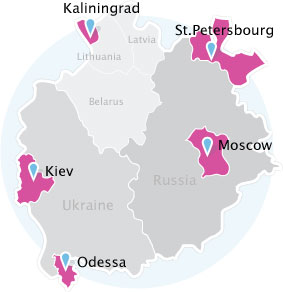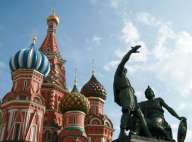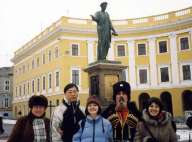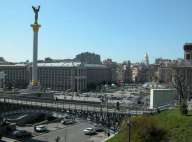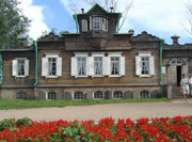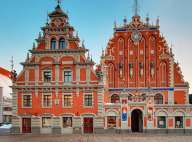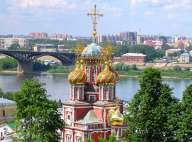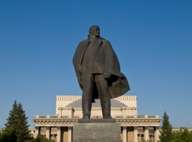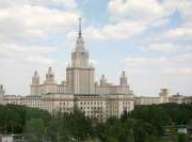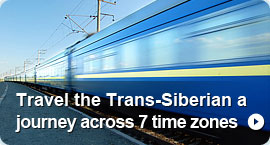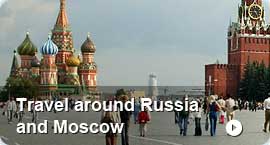Russian education system
Education System in Russia
Russia has a long-standing tradition in high-quality education for all citizens. It probably has also one of the best mass-eduction systems in the world producing a literacy rate (98%) exceeding most Western European countries. Education is split into a compulsory Basic Education, and ongoing Higher Education.
Compulsory Basic Education
Basic general education lasts for nine years. Graduates of this level may continue their education at senior high school to receive secondary general education. They may also enter an initial vocational school or non-university level higher education institutions. Initial vocational schools include PTU (Professional’no-technicheskoe uchilische) which offer one-and-a-half to two years’ purely professional education and a Professional’ny Litsei which offer joint professional and secondary general education for three to four years and skilled workers’ training at different levels. Non-university level higher education institutions also offer three- to four-year professional and secondary general education and two-year vocational training for holders of the School Leaving Certificate. Secondary general education on the basis of basic general education continues for two years and ends when students are 17-18. Graduates from a secondary general school may apply for entrance to a higher education institution. Secondary education leads to the award of the Attestat o Srednem (Polnom) Obshchem Obrasovanii (Certificate of Secondary Complete General Education).
Higher Education
Higher education is provided by public and non-public (non-State) accredited higher education institutions. There are two levels of higher education:
- Basic higher education (4 years) leading to the Bakalavr’s degree, the first university level degree. This is equivalent to the B.Sc. degree in the US or Western Europe
- Postgraduate higher education (5-6 years or more). After two years, students are entitled to receive a Magistr’s degree. This is equivalent to a Master’s Degree (M.Sc, M.A.) in the US or Western Europe. After a Master’s degree, students can continue to study towards a doctoral degree: Kandidat Nauk degree (the first level, equivalent to Ph.D.) and Doktor Nauk degree (the second, highest level, equivalent to Professor).
The Bakalavr’s (Bachelor’s) degree programmes last for at least 4 years of full-time university-level study. The programmes are elaborated in accordance with the State Educational Standards which regulate almost 80% of their content. The other 20% are elaborated by the university itself. The programmes include professional and special courses in Science, the Humanities and Social-economic disciplines, professional training, completion of a research paper/project and passing State final exams. Having obtained the Bakalavr’s degree, students may apply to enter the Magistr’s programme or continue their studies in the framework of the Specialist’s Diploma programmes. The Bakalavr’s degree is awarded in all fields except Medicine after defending a Diploma project prepared under the guidance of a supervisor and passing the final exams. In Medicine, the first stage lasts for six years.
Holders of the Bakalavr’s (Bachelor) degree are admitted to enter the Specialist Diploma and Magistr’s (Master’s) degree programmes. Access to these programmes is competitive. The Magistr’s (Master’s) degree is awarded after successful completion of two years’ full-time study. Students must carry out a year of research including practice and prepare and defend a thesis which constitutes an original contribution and sit for final examinations.
Access to the Kandidat Nauk (Aspirantura) level again is very competitive. Candidates must hold a Specialist Diploma or a Magistr’s degree. Studies last for 3 years. The Aspirantura prepares for research and professorial activities. Students must learn teaching methods, ICTs, and pass qualifying (Kandidat Nauk) exams. They carry out independent research, prepare and defend a dissertation in public. They are then awarded the scientific degree of Kandidat Nauk. The Doctor Nauk programme is specific and its duration is not fixed. It follows the Kandidat Nauk and is awarded after preparation and public defence of a dissertation.
History of education in Russia
Russia’s higher education system started with the foundation of the universities in Moscow and St. Petersburg in the middle of the 18th century. The system was constructed similar to that of Germany. In Soviet times all of the population in Russia had at least a secondary education. The pursuit of higher education was and still is considered to be very prestigious. More than 50% of people have a higher education.
Due in great part to demands of the international educational organizations, the system of education in Russia began to change over the past four to five years. Universities began transitioning to a system similar to that of Britain and the USA: 4 years for the Bachelor’s degree and 2 years for a Master’s degree. The universities are still in the process of these changes; some of them offer the new system and others still work according to the prior 5-year system, particularly in programs such as law.
Entry requirements for Russia’s universities
Russia’s top universities have very competitive entry requirements, and special entry exams are held each year. Students with Russian citizenship, regardless of residency outside of Russia, must apply for studies according to the standard competitive system and directly with a faculty admissions office. If you have dual citizenship, you can apply as a foreign student using the non-Russian passport. Applicants for advanced degrees (M.A./M.Sc., Ph.D., D.Sc.) should have their prior degree in the same or a very similar field. This is a more strict requirement than in some other countries, especially the US.
One of the great attractions of education in Russia is the cost, especially when compared to the quality. Degree study tuition can range from $2000 to $8000 per year, with other costs (room & board, books, etc.) ranging from $1500 to $5000 per year, depending on location and spending habits.
Many Russian universities also offer distance education and provide courses for the public and for specific professional needs. However, such systems are usually less developed than in the US and other Western European countries.
The academic year lasts from Sept 1 to Mid June everywhere, with long summer vacations from July 1st to Aug 31.
Training of teachers in Russia
A very important part of Russia’s education system is the training of teachers. There are three levels: primary/basic, secondary and higher level teachers.
- Training of pre-primary and primary/basic school teachers
Non-university level educational institutions (technikums, colleges) train teachers for pre-primary and primary schools. The duration of the course is two to four-and-a-half years. Some teacher training institutions of university level train teachers for primary schools. The course lasts for five years. Graduates of these two types of educational institutions may exercise the profession.
- Training of secondary school teachers
Teacher training is carried out in teacher training university-level institutions. The programme lasts for at least five years. Graduates may enter the profession.
- Training of higher education teachers
University teachers must have followed post-graduate training. A scientific degree (Kandidat Nauk at least) is compulsory. Lecturers are appointed on a contract basis by the departments, tenured professors are appointed by the university.

